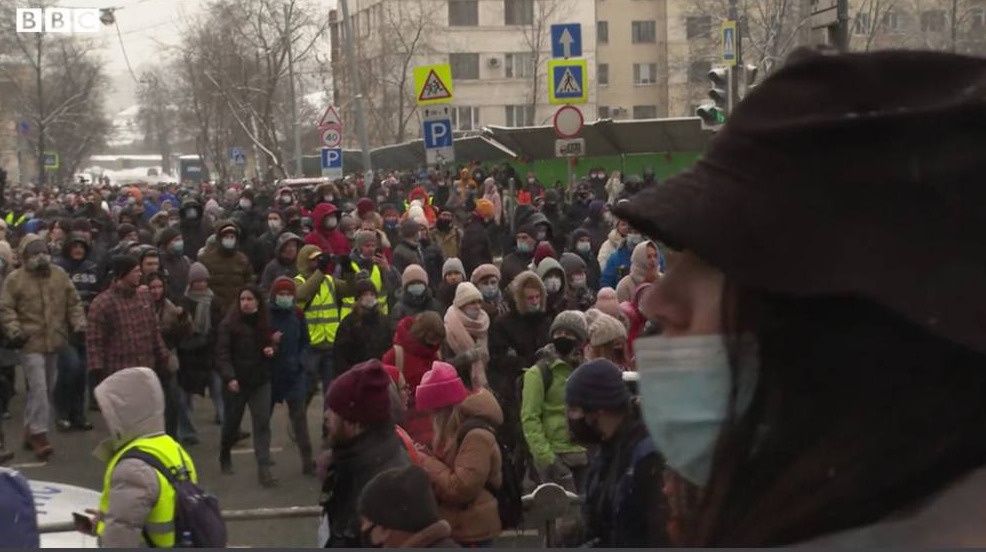
Tens of thousands of protesters across Russia defied threats of arrest Sunday to demand freedom for jailed Kremlin critic Alexei Navalny, the anti-corruption agitator poisoned last summer by a Soviet-era chemical weapon purportedly under military lock and key.
The demonstrations of the past two weeks against the repressive policies and actions of President Vladimir Putin have been the largest in almost a decade and have drawn in disparate opposition forces, from Communists to monarchists to Russian nationalists cheering on land grabs in Ukraine.
Leaders of Navalny’s Anti-Corruption Foundation contend the uprising against Putin is different this time and predict the surging anger over the president’s excesses and bungling of the economy and the Covid-19 pandemic will force an end to his 21-year hold on Kremlin power.
We’ve seen this movie before.
Months of opposition protests were ignited in 2011 after rampant fraud was alleged in parliamentary elections. Anger at the constitutional manipulation to revise term limits and allow Putin to run for a third and fourth term, drew tens of thousands to the streets ahead of the 2012 presidential election. Putin won by a landslide 64% over four other contenders across a wide ideological spectrum.
Ferocious protests over Putin’s reinstating of state control over independent media early in his first term flared in 2001 with each seizure of popular television and news operations, then fizzled as the Kremlin waited out the unrest.
Putin is embracing the same strategy that has worked in the past: He accuses Western liberal forces — the United States in particular — of stirring up Russian discontent they hope will lead to regime change.
President Joe Biden spoke with Putin shortly after his inauguration in a call that White House press officials report included urging the Kremlin leader to release Navalny and cease the harsh crackdown on peaceful protesters.
After Sunday’s repeat of Russian security forces blocking off protest venues and arresting at least 4,000 who slipped through the cordons, newly confirmed Secretary of State Anthony Blinken issued a statement condemning the Russian government’s brutal dispersing of the crowds.
“The U.S. condemns the persistent use of harsh tactics against peaceful protesters and journalists by Russian authorities for a second week straight. We renew our call for Russia to release those detained for exercising their human rights, including Aleksey Navalny,” Blinken said via Twitter.
A lengthy article in the respected British newspaper The Guardian on Friday quoted a Soviet-era diplomat and KGB agent as saying Trump was cultivated as a Russian asset over a 40-year Kremlin campaign to exploit a narcissistic personality “extremely vulnerable intellectually, and psychologically, and he was prone to flattery,” the former envoy to Washington Yuri Shvets told the newspaper.
The change in U.S. administration from Trump’s fawning attitude toward Putin is part of the Russian opposition’s optimism that this protest wave could be successful in putting an end to Putin’s reign. Polls, though seldom an accurate reflection of Russians’ political leanings, show a sharp migration away from Putin by young voters. Navalny’s foundation estimated the average age of protesters in the first mass demonstration on Jan. 23 was 31 years old.
U.S. and European sanctions imposed on Russia after Putin’s seizure and annexation of Ukraine’s Crimean Peninsula in 2014 have deprived Russia of Western investment and trade, leading to an estimated 10% decline in Russian workers’ income. The Crimean land grab was condemned as illegal by most of the developed world but boosted Putin’s approval rating upward of 80% among a nation chafing at its diminished world status after the 1991 breakup of the Soviet Union.
The economic hit to the average household, compounded by a dramatic fall in oil prices for Russia’s dominant export and bungling of the Covid-19 pandemic response on a level that rivals Trump’s, have soured the national mindset on Putin, opposition leaders contend.
“As history shows, most dictatorships fall not under the power of their opponents but under the weight of their own mistakes,” Vladimir Kara-Murza wrote in an opinion piece for the Washington Post on Friday. “It seems that Putin’s will not be an exception.”
Kara-Murza, like Navalny and exiled former Russian double agent Sergei Skripal, suffered near-death poisonings with the same Soviet-made nerve agent in 2015 and 2017, while still living in Russia. He now has permanent U.S. residency.
Russian outrage over Navalny’s arrest upon return to Moscow after five months’ convalescing in Berlin was amplified last week by the release of a video by the opposition leader’s foundation exposing a garishly opulent mansion on the Black Sea reportedly built with state funds and destined to be the future home of Putin. Entitled “The World’s Largest Bribe,” the investigative film shows an Italianate palace compound estimated to have cost $1.4 billion, complete with a casino, an ice rink, helicopter landing pad and vineyard.
More than 100 million people have viewed the video on YouTube, most of them from Russia. Putin’s spokesman, Dmitri Peskov, denied the mansion belonged to the president, who dismissed the video expose as “boring.”
Putin’s childhood friend and billionaire collaborator Arkady Rotenberg claimed last week to be the owner of the lavish palace he plans to manage as an apartment hotel. Navalny’s report that the compound was built with state funds and Rotenberg’s contention he is the owner may both be true: Rotenberg profited from double-digit billions of dollars in contracts awarded by the Kremlin for building the 2014 Winter Olympics venues in the Black Sea city of Sochi.
Late Russian opposition figure Boris Nemtsov, whose 2015 assassination was widely assumed to have been ordered by the Kremlin, released a scathing report just before his killing that detailed massive fraud and bribery in the awarding of contracts to build competition facilities and accommodations estimated to have cost more than $50 billion.
Discover more from Post Alley
Subscribe to get the latest posts sent to your email.

Really helpful analysis. Putin seems to have very strong survival skills.